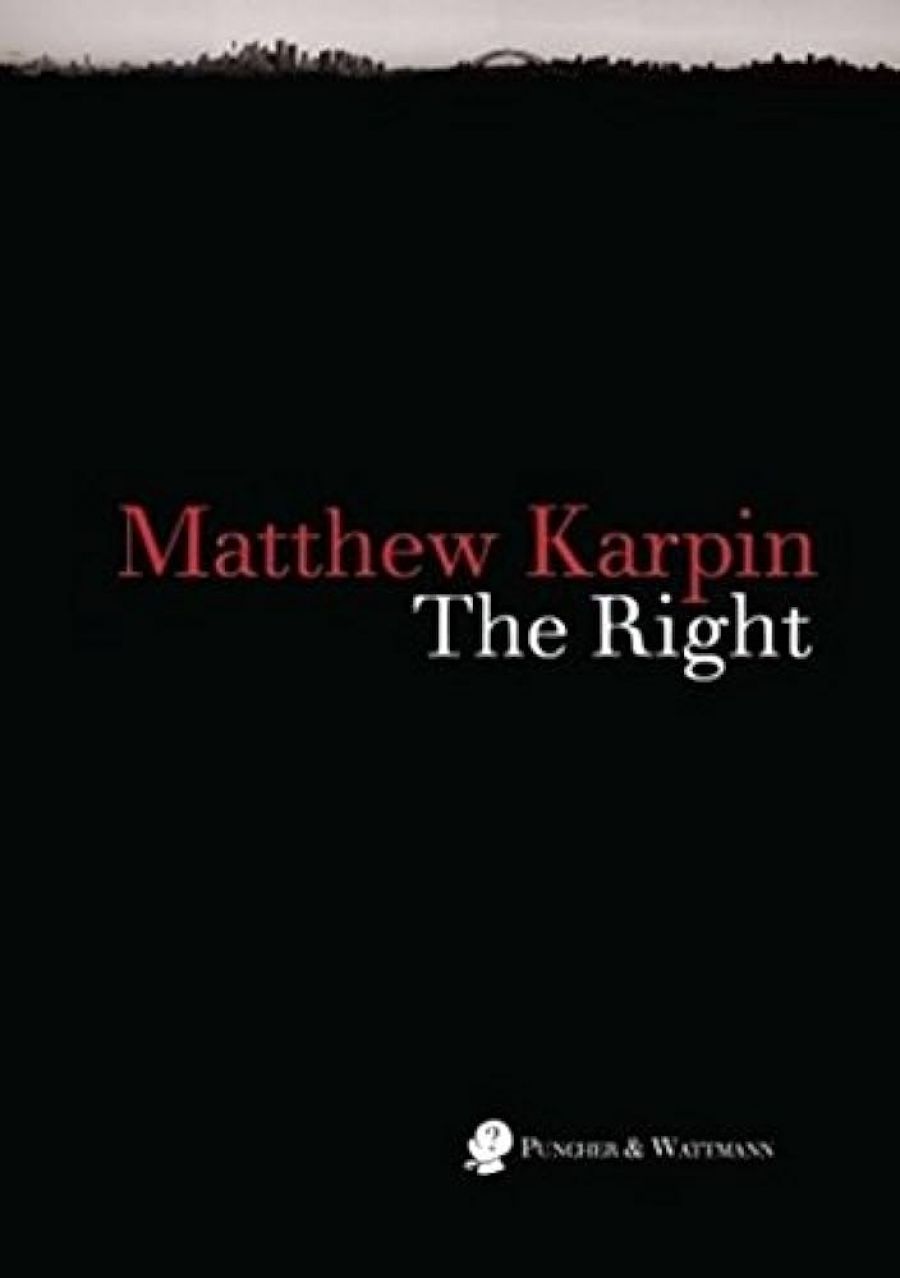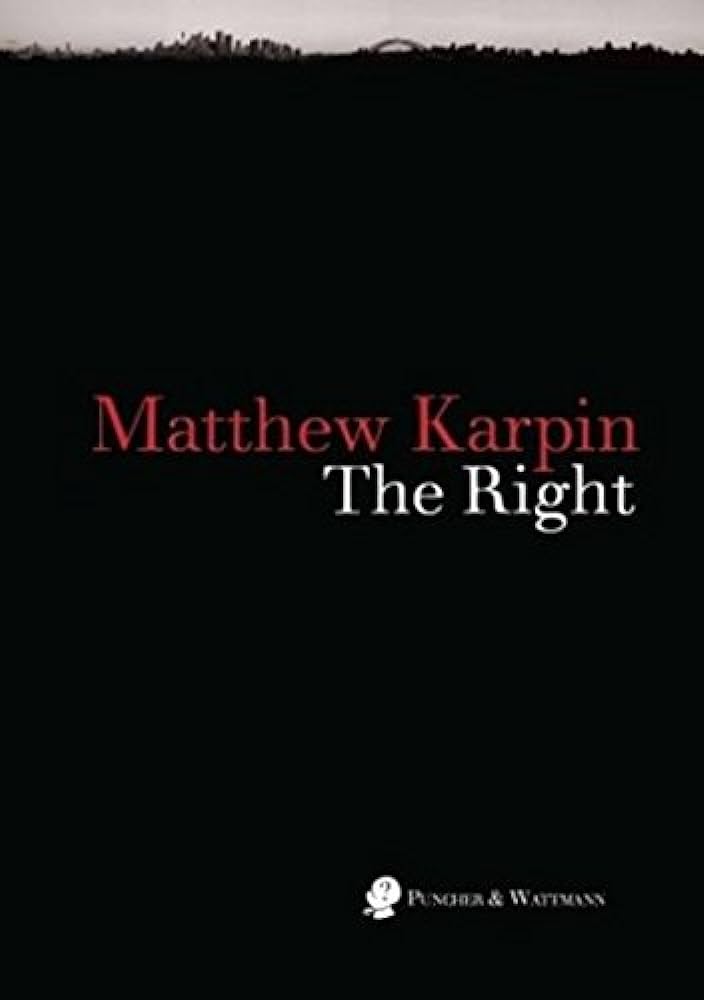
- Free Article: No
- Contents Category: Australian Fiction
- Review Article: Yes
- Article Title: The pyre of ambition
- Online Only: No
- Custom Highlight Text:
After abandoning its ideals, the Australian Labor Party ‘degenerated into a vast machine for capturing political power’: that was the diagnosis of Vere Gordon Childe, the polymathic party insider, and he was writing in 1923. The brutality of Labor machine politics is hardly news, but it remains relatively unexplored territory in Australian fiction. Matthew Karpin’s latest novel gives us the blackest of the factional black hats – the right – doing deals and scheming schemes in an imaginary New South Wales state government during the mid 1990s. Satire is the usual Australian response to the venality of those who govern us, but Karpin’s approach, by contrast, is intensely serious, as he presents the inner lives and inner demons of a large cast of parliamentarians and apparatchiks. In that respect, The Right is as much a psychological novel as it is a political one.
- Book 1 Title: The Right
- Book 1 Biblio: Puncher & Wattman, $28 pb, 322 pp
- Book 1 Cover Small (400 x 600):

- Book 1 Cover (800 x 1200):

‘Jewish body, short legs, mental agility’: this is how The Right’s main character, Michael Kutin, sums himself up early in the book, while he is taking a swim at a party conference and eyeing off his more telegenic rivals. Kutin might not be the handsomest devil going around, but he is one of Labor’s star recruits – a medical specialist, tough-minded and well connected. The novel opens with his attempt to win preselection for one of Labor’s safest state seats, where a by-election is soon to be held. Kutin is aligned with the right, which regards the seat as its own.
As expected, this preselection process involves a good deal of skulduggery (‘Labor’s branches are rorted and its membership base is a joke,’ Mark Latham once confided to his diary). Kutin’s factional opponents hatch a plan to secure the support of rank-and-file members by giving them tickets to a Rod Stewart concert. But the right wins out, largely through a bit of well-timed physical violence by its goons (they nick the concert tickets, as well). Kutin is endorsed as Labor’s candidate and then skates it in at the by-election. Short legs and all, he is on his way.
The Right is not the story of a man being gradually corrupted by his experience of power. Rather, Kutin seems rotten from the start (‘a classic egomaniac’, one rival calls him, while another prefers the epithet ‘unspeakable bastard’, which probably amounts to the same thing). Politics is certainly in Kutin’s blood: his parents are Russian émigrés who were once active in the Byzantine world of the Soviet Communist Party. It would be an understatement to say that this foreign background (not to mention his Jewishness) makes Kutin feel like the perpetual underdog; to put it mildly, he has very large chips on both his shoulders. But ethnicity matters in modern politics; it is one of the surest ways to forge alliances.
Kutin is particularly close to an old family acquaintance (one hesitates to describe anyone in this novel as a friend) – a shadowy Russian-born businessman called Donald Rastovich, who generously supplies the young parliamentarian with a slush fund and a dirt file on his factional colleagues. Loyalty is thin on the ground in the Labor machine, and Kutin is already well practised in the dark arts of political treachery. Despite his education and profession, Kutin is essentially no different from any of the other party’s hard men (and in this novel they are invariably men) who convince themselves that the political end justifies any dastardly means.
Habits of deception have also carried over into Kutin’s personal life. For some time he has been having an extramarital affair with a sexy party researcher called Libby McDonald, who has started dropping hints that it is high time the not-so-good doctor left his long-suffering wife. Much of the novel’s tension comes from this love triangle, though why any intelligent woman would put up with a rogue like Kutin is anybody’s guess. Rastovich learns of the affair and, for some largely unexplained reason, takes the side of the betrayed wife. Will Kutin follow his heart and risk alienating the man who is bankrolling his career? Only the most charitable reader could have any sympathy for his dilemma. Kutin really is a monster, someone prepared to sacrifice everything – love, sex, integrity, happiness – on the pyre of political ambition. It is not that he is unfeeling; rather, it is more a case of being willing to pay any price to get to the top. In that sense, the cultured medico is perfectly at home with the bagmen and toecutters of the right.
Matthew Karpin has hit upon an ideal narrative style for depicting the machinations of the political mind. The Right’s prose has a sort of fluidity about it; dialogue, for instance, is not marked in any special way, so it tends to merge with the oscillations of each character’s consciousness. Booze flows, which adds to the general sense of a fluid reality, suggesting a blurred line between public life and the private self.
There are some lapses, however. Worried about looking like a cold fish on television, Kutin wonders, ‘Would a camera adumbrate such sang-froid?’; only people in novels think like that. Sometimes the narrator intervenes a little clumsily – at one point it is said of Kutin that ‘the closer he came to power, the more he lost out personally’. A few anachronisms also jar. In one scene, Libby bemoans the lot of female politicians, citing Pauline Hanson and Natasha Stott Despoja as examples; but this is 1994 and neither of these women was even in parliament then. These misgivings aside, The Right offers a convincing portrait of the modern political landscape. And what bleak territory it is: tedious conferences, crooked donors, psychotic hatchet men and a conga line of sycophants. All of this is well described here; the ogreish Kutin is ultimately credible because the reader knows that such monsters really do exist.


Comments powered by CComment